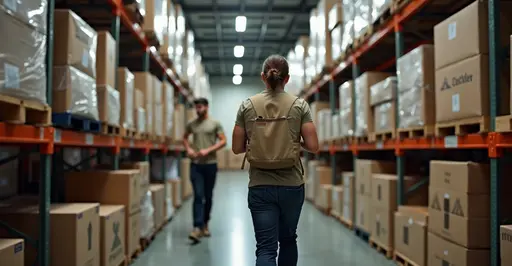Tech and logistics workers are achieving major union victories in 2025, with Amazon warehouse organizing, Microsoft's first union contract, and UPS labor disputes highlighting growing worker power despite corporate resistance.

Labor Movement Gains Momentum Across Key Industries
In a remarkable shift for traditionally anti-union sectors, tech and logistics workers are achieving unprecedented organizing victories in 2025. From Amazon warehouses to Microsoft gaming studios, employees are leveraging collective bargaining power to secure better wages, working conditions, and job protections despite fierce corporate resistance.
Amazon Workers Break New Ground
The Teamsters union is making significant progress organizing Amazon warehouse workers, with recent National Labor Relations Board rulings ordering the e-commerce giant to begin bargaining with over 100 workers at DCK6 in San Francisco. 'This represents a major breakthrough after years of Amazon's union-busting tactics,' said labor organizer Maria Rodriguez. 'Workers are finally seeing their rights protected through the NLRB's Cemex ruling.'
However, the path to actual contracts remains challenging. Three years after Amazon's Staten Island JFK8 warehouse made history by voting to form the company's first U.S. union, workers still haven't secured a first contract. Amazon has spent over $14 million on anti-union consultants and continues to fight union recognition through legal challenges.
Tech Sector Unionization Accelerates
The technology industry is experiencing its most significant unionization wave in decades. Microsoft recently signed its first-ever US union contract with ZeniMax QA workers, while union formations are spreading across major companies including Alphabet, Kickstarter, and the New York Times.
'Tech workers are waking up to the power of collective action,' explained CODE-CWA organizer David Chen. 'After years of layoffs and AI-driven uncertainty, employees are realizing that unions provide crucial safeguards for fairness and representation.' A recent Blind survey found 67% of tech employees would likely join a union, reflecting a dramatic shift in industry attitudes.
Logistics Sector Showdowns
In the logistics sector, UPS is facing major labor disputes with the Teamsters Union representing 340,000 workers. The company's plan to offer voluntary buyouts to drivers has sparked union outrage, with Teamsters President Sean O'Brien calling it 'an illegal violation of our national contract.'
The conflict comes despite UPS's 2023 contract commitment to create 22,500 new jobs. 'Profits should not come before people,' O'Brien emphasized in a recent statement.
Employer Responses and Legal Battles
Major corporations are responding to unionization efforts with sophisticated anti-union strategies. According to Economic Policy Institute research, companies are increasingly using mandatory anti-union meetings, surveillance of workers, firing union supporters, and captive audience meetings to discourage collective bargaining.
However, workers are finding success through strategic organizing. The AFL-CIO's recent 'Worker Wins' report highlights multiple victories including IBEW securing landmark agreements with CBS featuring historic wage increases and AI provisions, and 420 StarPlus Energy workers in Indiana forming a union with UAW.
Future Challenges and Opportunities
Despite these gains, significant challenges remain. As noted in Jacobin's analysis, while unions achieved a 79% NLRB election win rate in 2023, the labor movement needs to organize millions annually, not thousands, to achieve meaningful growth.
'Unions must relearn how to organize outside the NLRB process and mount comprehensive campaigns against powerful corporations,' said labor strategist Rebecca Torres. 'With political headwinds increasing, worker- and community-centered strategies with escalating actions are essential for building leverage.'
The ongoing struggles at Amazon warehouses and UPS facilities demonstrate that winning elections is only the first step - securing enforceable contracts requires sustained pressure and strategic organizing in the face of corporate resistance.

 Nederlands
Nederlands
 English
English
 Deutsch
Deutsch
 Français
Français
 Español
Español
 Português
Português









